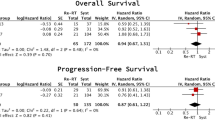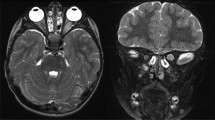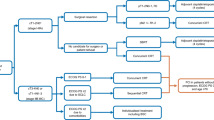Abstract
Purpose
To examine the differential effects of SRS and TKI on EGFR-mutated NSCLC patients with brain metastases (BMs) and outcomes following continuation of the same TKI agent in case of new BMs.
Methods
This study included 608 NSCLC patients (2,274 BMs) while meta-analyses included 1,651 NSCLC patients (> 3,944 BMs). Overall survival (OS) and intracranial progression free survival (iPFS) were estimated using Kaplan-Meier methods. Hazard ratios (95% CI) of prognostic factors were estimated using Cox regression models.
Results
The median OS/iPFS (95% CI) (months) for patients with wildtype EGFR/ALK, EGFR mutations, and ALK rearrangements were 17.7 (12.9–23.6)/12.1 (9.8–15.6), 28.9 (23.8–33.3)/17.7 (14.8–21.2), and 118.0 (not reached)/71.7 (15.1–not reached), respectively. In EGFR-mutated patients, meta-analyses combining our data showed significantly improved OS and iPFS of patients who received SRS and TKI (OS:35.1 months, iPFS:20.0 months) when compared to those who have SRS alone (OS:20.8 months, iPFS:11.8 months) or TKI alone (OS:24.3 months, iPFS:13.8 months). Having SRS for newly diagnosed BMs while keeping the existing TKI agent yielded OS (30.0 vs. 32.1 months, p = 0.200) non-inferior to patients who started combined SRS and TKI therapy for their newly diagnosed NSCLC with BMs. Multivariable analyses showed that good performance score and TKI therapy were associated with improved outcomes.
Conclusions
Combined SRS and TKI resulted in favorable outcomes in EGFR-mutated NSCLC patients with newly diagnosed BMs. Continuation of the same TKI agent plus SRS in case of new brain metastases yielded good clinical outcomes and may be considered a standard-of-care treatment.



Similar content being viewed by others
Data Availability
The study data are available from the corresponding author upon reasonable request.
Abbreviations
- ALK:
-
Anaplastic lymphoma kinase
- BMs:
-
Brain metastases
- CI:
-
Confidence interval
- EGFR:
-
Epidermal growth factor receptor
- GKRS:
-
Gamma Knife radiosurgery
- HR:
-
Hazard ratio
- IQR:
-
Interquartile range
- KPS:
-
Karnofsky performance score
- NSCLC:
-
Non-small cell lung cancer
- OS:
-
Overall survival
- iPFS:
-
Intracranial progression free survival
- RT:
-
Radiation therapy
- SRS:
-
Stereotactic radiosurgery
- TKI:
-
Tyrosine kinase inhibitor
- TTP:
-
Time to intracranial tumor progression
- WBRT:
-
Whole brain radiation therapy
References
Li L, Luo S, Lin H et al (2017) Correlation between EGFR mutation status and the incidence of brain metastases in patients with non-small cell lung cancer. J Thorac Dis 9:2510–2520
Shin DY, Na II, Kim CH et al (2014) EGFR mutation and brain metastasis in pulmonary adenocarcinomas. J Thorac Oncol 9:195–199
Zhang I, Zaorsky NG, Palmer JD et al (2015) Targeting brain metastases in ALK-rearranged non-small-cell lung cancer. Lancet Oncol 16:e510–521
Rosell R, Moran T, Queralt C et al (2009) Screening for epidermal growth factor receptor mutations in lung cancer. N Engl J Med 361:958–967
Jiang T, Min W, Li Y et al (2016) Radiotherapy plus EGFR TKIs in non-small cell lung cancer patients with brain metastases: an update meta-analysis. Cancer Med 5:1055–1065
Singh R, Lehrer EJ, Ko S et al (2020) Brain metastases from non-small cell lung cancer with EGFR or ALK mutations: a systematic review and meta-analysis of multidisciplinary approaches. Radiother Oncol 144:165–179
Chiou GY, Chiang CL, Yang HC et al (2021) Combined stereotactic radiosurgery and tyrosine kinase inhibitor therapy versus tyrosine kinase inhibitor therapy alone for the treatment of non-small cell lung cancer patients with brain metastases. J Neurosurg ; 1–8
Magnuson WJ, Lester-Coll NH, Wu AJ et al (2017) Management of brain metastases in tyrosine kinase Inhibitor-Naïve epidermal growth factor receptor-mutant non-small-cell Lung Cancer: a retrospective multi-institutional analysis. J Clin Oncol 35:1070–1077
Brown PD, Jaeckle K, Ballman KV et al (2016) Effect of Radiosurgery alone vs Radiosurgery with Whole Brain Radiation Therapy on cognitive function in patients with 1 to 3 brain metastases: a Randomized Clinical Trial. JAMA 316:401–409
Crossen JR, Garwood D, Glatstein E, Neuwelt EA (1994) Neurobehavioral sequelae of cranial irradiation in adults: a review of radiation-induced encephalopathy. J Clin Oncol 12:627–642
Barnet MB, O’Toole S, Horvath LG et al (2017) EGFR-Co-Mutated Advanced NSCLC and Response to EGFR tyrosine kinase inhibitors. J Thorac Oncol 12:585–590
De Pas T, Toffalorio F, Manzotti M et al (2011) Activity of epidermal growth factor receptor-tyrosine kinase inhibitors in patients with non-small cell lung cancer harboring rare epidermal growth factor receptor mutations. J Thorac Oncol 6:1895–1901
Massarelli E, Johnson FM, Erickson HS et al (2013) Uncommon epidermal growth factor receptor mutations in non-small cell lung cancer and their mechanisms of EGFR tyrosine kinase inhibitors sensitivity and resistance. Lung Cancer 80:235–241
Doherty MK, Korpanty GJ, Tomasini P et al (2017) Treatment options for patients with brain metastases from EGFR/ALK-driven lung cancer. Radiother Oncol 123:195–202
Lee CC, Hsu SPC, Lin CJ et al (2019) Epidermal growth factor receptor mutations: association with favorable local tumor control following Gamma Knife radiosurgery in patients with non-small cell lung cancer and brain metastases. J Neurosurg ; 1–8
Lee CC, Yen CP, Xu Z et al (2014) Large intracranial metastatic tumors treated by Gamma Knife surgery: outcomes and prognostic factors. J Neurosurg 120:52–59
Page MJ, McKenzie JE, Bossuyt PM et al (2021) The PRISMA 2020 statement: an updated guideline for reporting systematic reviews. BMJ 372:n71
Wells GA, Shea B, O’Connell D et al The Newcastle-Ottawa Scale (NOS) for assessing the quality of nonrandomised studies in meta-analyses. In
Byeon S, Ham JS, Sun JM et al (2016) Analysis of the benefit of sequential cranial radiotherapy in patients with EGFR mutant non-small cell lung cancer and brain metastasis. Med Oncol 33:97
Chen Y, Yang J, Li X et al (2016) First-line epidermal growth factor receptor (EGFR)-tyrosine kinase inhibitor alone or with whole-brain radiotherapy for brain metastases in patients with EGFR-mutated lung adenocarcinoma. Cancer Sci 107:1800–1805
Gerber NK, Yamada Y, Rimner A et al (2014) Erlotinib versus radiation therapy for brain metastases in patients with EGFR-mutant lung adenocarcinoma. Int J Radiat Oncol Biol Phys 89:322–329
He ZY, Li MF, Lin JH et al (2019) Comparing the efficacy of concurrent EGFR-TKI and whole-brain radiotherapy vs EGFR-TKI alone as a first-line therapy for advanced EGFR-mutated non-small-cell lung cancer with brain metastases: a retrospective cohort study. Cancer Manag Res 11:2129–2138
Iuchi T, Shingyoji M, Sakaida T et al (2013) Phase II trial of gefitinib alone without radiation therapy for japanese patients with brain metastases from EGFR-mutant lung adenocarcinoma. Lung Cancer 82:282–287
Jia F, Cheng X, Zeng H et al (2019) Clinical research on stereotactic radiosurgery combined with epithermal growth factor tyrosine kinase inhibitors in the treatment of brain metastasis of non-small cell lung cancer. J buon 24:578–584
Kim HJ, Kim WS, Kwon DH et al (2015) Effects of an epithelial growth factor receptor-tyrosine kinase inhibitor add-on in stereotactic radiosurgery for Brain Metastases originating from Non-Small-Cell Lung Cancer. J Korean Neurosurg Soc 58:205–210
Park SJ, Kim HT, Lee DH et al (2012) Efficacy of epidermal growth factor receptor tyrosine kinase inhibitors for brain metastasis in non-small cell lung cancer patients harboring either exon 19 or 21 mutation. Lung Cancer 77:556–560
Wang C, Lu X, Zhou Z et al (2019) The efficacy of Upfront Intracranial Radiation with TKI compared to TKI alone in the NSCLC Patients Harboring EGFR Mutation and Brain Metastases. J Cancer 10:1985–1990
Wang W, Song Z, Zhang Y (2018) Efficacy of brain radiotherapy plus EGFR-TKI for EGFR-mutated non-small cell lung cancer patients who develop brain metastasis. Arch Med Sci 14:1298–1307
Yang WC, Xiao F, Shih JY et al (2018) Epidermal growth factor receptor mutation predicts favorable outcomes in non-small cell lung cancer patients with brain metastases treated with stereotactic radiosurgery. Radiother Oncol 126:368–374
Zhu Q, Sun Y, Cui Y et al (2017) Clinical outcome of tyrosine kinase inhibitors alone or combined with radiotherapy for brain metastases from epidermal growth factor receptor (EGFR) mutant non small cell lung cancer (NSCLC). Oncotarget 8:13304–13311
Chang CY, Chen CY, Chang SC et al (2021) Efficacy and prognosis of first-line EGFR-Tyrosine kinase inhibitor treatment in older adults including poor performance status patients with EGFR-Mutated non-small-cell Lung Cancer. Cancer Manag Res 13:7187–7201
Cheng WC, Shen YC, Chien CR et al (2022) The optimal therapy strategy for epidermal growth factor receptor-mutated non-small cell lung cancer patients with brain metastasis: a real-world study from Taiwan. Thorac Cancer 13:1505–1512
Miyawaki E, Kenmotsu H, Mori K et al (2019) Optimal sequence of local and EGFR-TKI therapy for EGFR-Mutant Non-Small Cell Lung Cancer with Brain Metastases stratified by number of Brain Metastases. Int J Radiat Oncol Biol Phys 104:604–613
Su PL, Wu YL, Chang WY et al (2018) Preventing and treating brain metastases with three first-line EGFR-tyrosine kinase inhibitors in patients with EGFR mutation-positive advanced non-small cell lung cancer. Ther Adv Med Oncol 10:1758835918797589
Yamamoto M, Serizawa T, Shuto T et al (2014) Stereotactic radiosurgery for patients with multiple brain metastases (JLGK0901): a multi-institutional prospective observational study. Lancet Oncol 15:387–395
Chang EL, Wefel JS, Hess KR et al (2009) Neurocognition in patients with brain metastases treated with radiosurgery or radiosurgery plus whole-brain irradiation: a randomised controlled trial. Lancet Oncol 10:1037–1044
Kobayashi S, Canepa HM, Bailey AS et al (2013) Compound EGFR mutations and response to EGFR tyrosine kinase inhibitors. J Thorac Oncol 8:45–51
Yip PY, Yu B, Cooper WA et al (2013) Patterns of DNA mutations and ALK rearrangement in resected node negative lung adenocarcinoma. J Thorac Oncol 8:408–414
Tam IY, Leung EL, Tin VP et al (2009) Double EGFR mutants containing rare EGFR mutant types show reduced in vitro response to gefitinib compared with common activating missense mutations. Mol Cancer Ther 8:2142–2151
Camidge DR, Kim HR, Ahn MJ et al (2021) Brigatinib Versus Crizotinib in ALK inhibitor-naive Advanced ALK-Positive NSCLC: final results of phase 3 ALTA-1L trial. J Thorac Oncol 16:2091–2108
Johung KL, Yeh N, Desai NB et al (2016) Extended survival and prognostic factors for patients with ALK-Rearranged non-small-cell Lung Cancer and Brain Metastasis. J Clin Oncol 34:123–129
Zou Z, Xing P, Hao X et al (2022) Intracranial efficacy of alectinib in ALK-positive NSCLC patients with CNS metastases-a multicenter retrospective study. BMC Med 20:12
Acknowledgements
We are thankful to the staff of Taipei Veterans General Hospital Gamma Knife group for data collection and data management.
Funding
This study was supported by Taipei Veterans General Hospital (VGHUST112-G and V110B-001). The sponsor had no role in the design of the study; the collection, analysis, or interpretation of the data; the writing of the manuscript; or the decision to submit the manuscript for publication.
Author information
Authors and Affiliations
Contributions
ASK and CCL conceived and designed the analysis. ASK conducted the statistical analysis and prepared the tables and figures. All authors helped in interpreting the findings. ASK wrote the first draft of the manuscript. All authors contributed toward subsequent revisions and approved the submitted manuscript.
Corresponding author
Ethics declarations
Ethics approval and consent to participate
Deidentified data was extracted for analysis. Written informed consent from each participant was waived and ethics approval for the study was obtained from the ethics committee of Taipei Veterans General Hospital.
Consent for publication
Not applicable.
Competing interests
The authors declare no competing interests.
Additional information
Publisher’s Note
Springer Nature remains neutral with regard to jurisdictional claims in published maps and institutional affiliations.
Electronic supplementary material
Below is the link to the electronic supplementary material.
Rights and permissions
Springer Nature or its licensor (e.g. a society or other partner) holds exclusive rights to this article under a publishing agreement with the author(s) or other rightsholder(s); author self-archiving of the accepted manuscript version of this article is solely governed by the terms of such publishing agreement and applicable law.
About this article
Cite this article
Kuan, A.S., Chiang, CL., Wu, HM. et al. Improved survival and intracranial tumor control of EGFR-mutated NSCLC patients with newly developed brain metastases following stereotactic radiosurgery and EGFR-TKI: a large retrospective cohort study and meta-analyses. J Neurooncol 164, 729–739 (2023). https://doi.org/10.1007/s11060-023-04452-x
Received:
Accepted:
Published:
Issue Date:
DOI: https://doi.org/10.1007/s11060-023-04452-x




